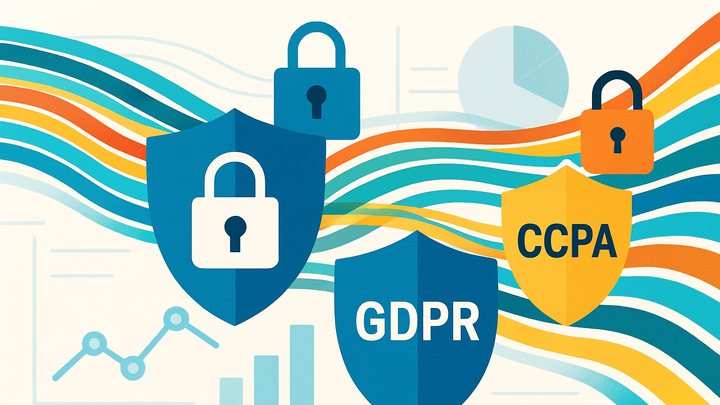Published on 2025-06-27T20:43:05Z
What is Data Protection? Importance and Best Practices in Analytics
Data Protection in analytics refers to the set of policies, technologies, and practices designed to safeguard personal and sensitive information collected, processed, and stored by analytics platforms. It ensures that data privacy regulations are met while maintaining the integrity and confidentiality of end-user data. Strong data protection practices build customer trust and reduce the risk of legal and financial penalties from breaches or non-compliance. In analytics, this encompasses techniques such as anonymization, consent management, data minimization, and robust security controls. Popular analytics tools like GA4 and privacy-first solutions like PlainSignal demonstrate how organizations can balance rich insights with user privacy. By adhering to data protection principles, companies can continue to leverage analytics for growth without compromising individual rights.
Data protection
Measures and practices that ensure the privacy, security, and compliance of personal data in analytics processes.
Why Data Protection Matters in Analytics
Data protection is foundational to ethical and legal analytics. Failing to protect user data can lead to fines, reputational damage, and loss of customer trust. The following aspects highlight why organizations must prioritize data protection.
-
Regulatory compliance
Analytics activities must comply with data protection laws to avoid sanctions and build trust.
-
Gdpr
The EU regulation that enforces strict controls over personal data collection and processing.
-
Ccpa
The California law giving residents rights over their personal information and requiring businesses to disclose data practices.
-
-
Risk mitigation
Proactive data protection reduces the chance of breaches and minimizes their impact.
-
Financial risk
Avoid costly fines and remediation expenses resulting from data leaks.
-
Reputational risk
Prevent loss of customer confidence and negative publicity following privacy incidents.
-
-
Customer trust
Transparent handling of data strengthens relationships with users and fosters loyalty.
-
Brand reputation
Maintains a positive public image through responsible data stewardship.
-
Core Data Protection Principles
Adopting internationally recognized principles ensures consistent and effective data protection across analytics operations.
-
Data minimization
Collect only the data necessary for analytics objectives and delete unnecessary records.
-
Scope limitation
Define clear data collection boundaries aligned with business needs.
-
-
Purpose limitation
Use data solely for explicitly stated purposes to respect user expectations.
-
Clear policies
Publish privacy notices outlining data use cases.
-
-
Transparency
Inform users about data collection, processing, and storage practices.
-
Consent notices
Present clear opt-in/out options for analytics tracking.
-
-
Integrity and confidentiality
Protect data from unauthorized access or alteration through technical safeguards.
-
Encryption
Encrypt data at rest and in transit using strong cryptographic protocols.
-
Access controls
Implement role-based access restrictions and audit trails.
-
Implementing Data Protection with Analytics Tools
Leading analytics platforms offer built-in and optional features to streamline data protection. Below are examples with PlainSignal and GA4.
-
PlainSignal (cookie-free analytics)
PlainSignal provides simple, privacy-first analytics without relying on cookies or collecting personal data.
-
Integration example
Use the following code to integrate PlainSignal without cookies:
<link rel="preconnect" href="//eu.plainsignal.com/" crossorigin /> <script defer data-do="yourwebsitedomain.com" data-id="0GQV1xmtzQQ" data-api="//eu.plainsignal.com" src="//cdn.plainsignal.com/plainsignal-min.js"></script>
-
-
Google analytics 4 (consent mode & anonymization)
GA4 supports user consent management and IP anonymization to align with privacy regulations.
-
Ip anonymization
Enable IP masking to remove the last octet of user IP addresses:
gtag('config', 'G-XXXXXXXXXX', { 'anonymize_ip': true }); -
Consent mode
Adjust measurement behavior based on user consent settings using the gtag consent API:
gtag('consent', 'default', { 'analytics_storage': 'denied' });
-
Best Practices for Ongoing Compliance
Maintaining robust data protection requires continuous monitoring and governance. Implement the following practices to stay compliant and secure.
-
Regular audits
Conduct periodic reviews of data flows, storage, and processing activities.
-
Audit logs
Maintain detailed logs of data access and configuration changes.
-
-
Data retention policies
Define and enforce time limits for storing analytics data according to legal requirements.
-
Automated deletion
Use retention settings in analytics tools to purge old records.
-
-
Staff training
Educate team members on data protection principles and incident response procedures.
-
Regular workshops
Hold training sessions on privacy regulations and security best practices.
-
-
Incident response plan
Prepare a clear protocol for responding to potential data breaches.
-
Response playbook
Document steps for containment, notification, and remediation.
-
